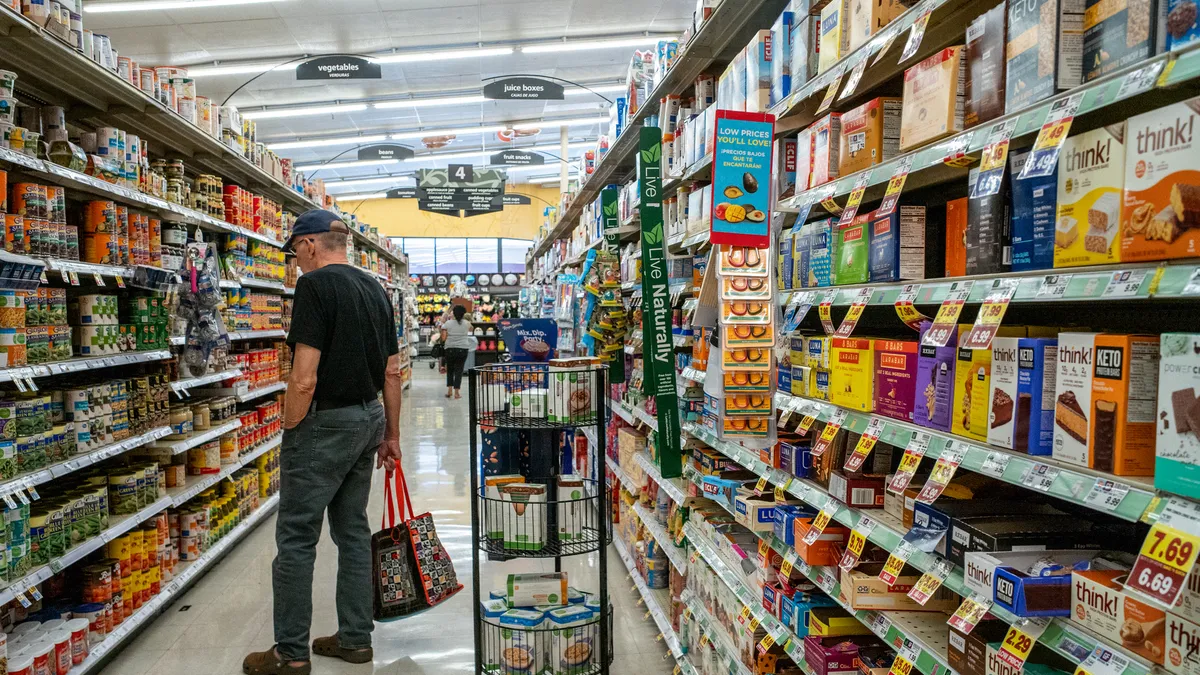Dive Brief:
- Consumer confidence sagged in February for the second straight month as expectations dimmed for business conditions, wages and employment, the Conference Board said Tuesday.
- The Consumer Confidence Index declined to 102.9 in February from 106 the prior month, the Conference Board said, noting a large drop in expectations in households aged 35 to 54 and among those earning $35,000 or more. A gauge of consumer expectations for the coming six months fell to the lowest level since July.
- Although the proportion of consumers saying jobs are plentiful rose to 52%, their view “appears considerably more pessimistic when looking ahead,” Ataman Ozyildirim, senior director for economics at the Conference Board, said in a statement. “Expectations for where jobs, incomes and business conditions are headed over the next six months all fell sharply in February.”
Dive Insight:
Consumer spending, which fuels nearly 70% of economic growth, rose 1.8% in January compared with December in the biggest increase in nearly two years.
U.S. households felt emboldened by the hot job market, Ozyildirim said. The U.S. added 517,000 jobs in January, pushing down unemployment to 3.4%, the lowest level since 1969.
Yet persistent inflation and rising borrowing costs may erode confidence and begin to inhibit spending, Ozyildirim said, noting that fewer consumers plan to buy homes or autos. “Consumers may be showing early signs of pulling back spending in the face of high prices and rising interest rates.”
The Federal Reserve since March 2022 has sought to quash inflation by raising the federal funds rate in the fastest monetary policy tightening in four decades.
The Consumer Price Index — fueled by energy and shelter prices — rose 0.5% in January in the biggest gain in three months and the producer price index for final demand, a measure of what suppliers charge, increased 0.7% in the largest gain since June.
High inflation and plans by Fed officials to increase the benchmark interest rate at meetings scheduled for March and May have kindled concerns of a downturn this year, according to Alexander Salter, a fellow at the American Institute for Economic Research.
“Consumers are spooked by the prospect of a recession,” according to Salter, an associate professor of economics at Texas Tech University. “Rising rates do pose some challenges for consumer credit, investment and other economy-wide spending areas,” he said, adding that a recession would probably not lead to widespread unemployment.
Twenty-eight percent of economists predict that a downturn will begin before April and 33% expect a slump to start during the second quarter, the National Association for Business Economics found in a survey.
Half of the respondents (51%) believe the possibility that the Fed will excessively tighten monetary policy poses the biggest risk to the economy, NABE said Monday, citing the Feb. 3-10 survey.
CFOs should prepare their companies for a continued increase in borrowing costs, Salter said in an email response to questions.
“For businesses, the most important thing over the one- to three-year horizon is working towards a capital structure that is robust to rising rates,” he said. “Wages will rise too, but probably no more than inflation.”
TechTrans, a logistics company, has sought to adjust to ebbing consumer confidence by improving the quality of its service, President and CFO Len Batcha said.
“We have adopted quality as our main focus, always,” he said in an email response to questions. TechTrans has reviewed the needs of all of its customers and is “budgeting to bolster technology and invest in new hires through local institutions of higher learning.”












